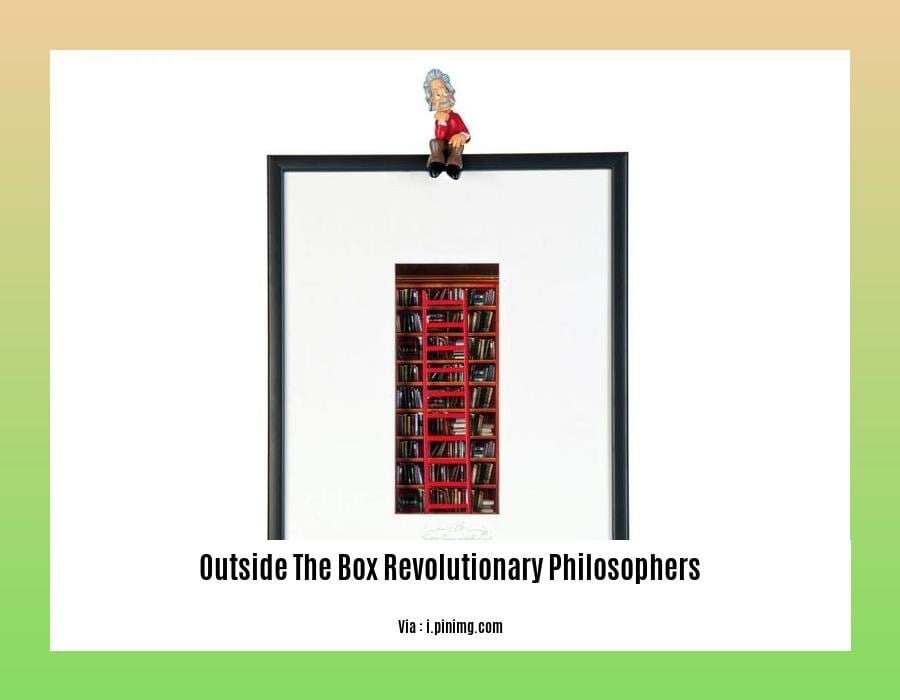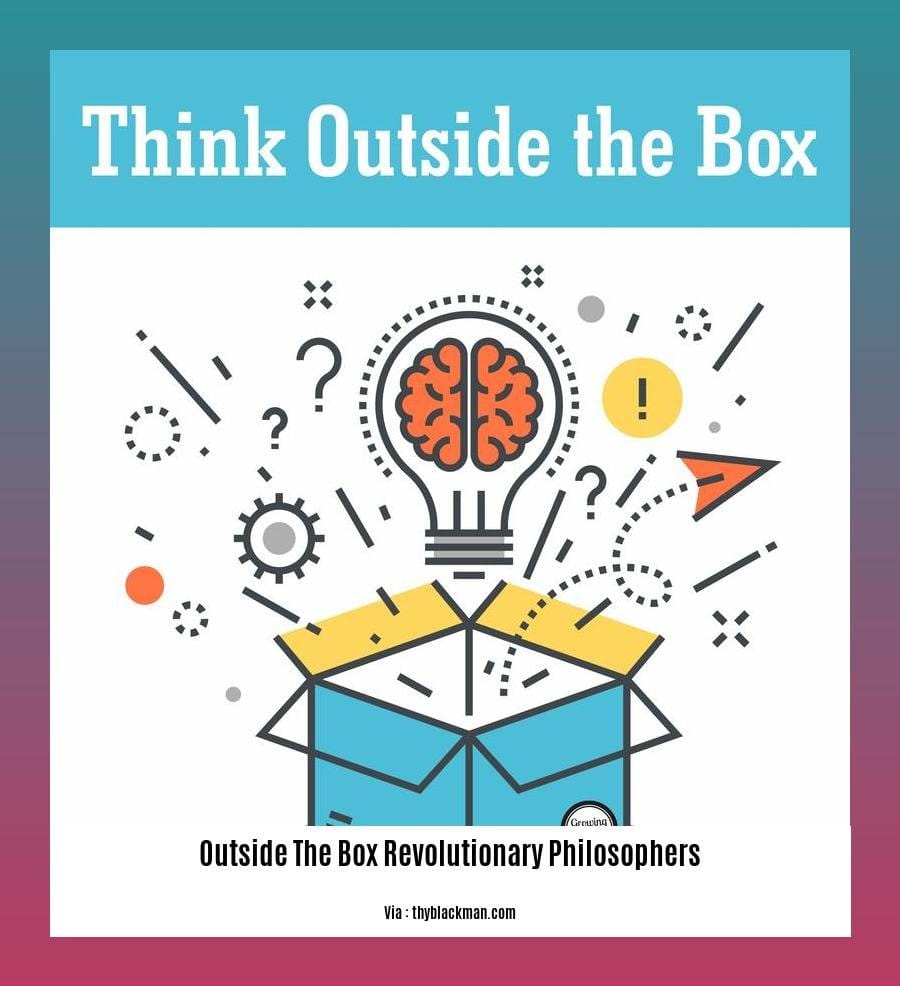Embark on an intellectual odyssey with “Outside-the-Box Revolutionary Philosophers: Challenging the Boundaries of Thought.” This article delves into the captivating realm of groundbreaking thinkers who audaciously question established norms and ignite revolutions in our understanding of the world.
Key Takeaways:

- The devaluation of humanities has led to a surge in philosophers emphasizing the significance of unconventional thinking.
- “Thinking outside the box” promotes a creative and unconventional approach to problem-solving.
- While commonly used, the metaphor of thinking “outside the box” may be misleading, as it suggests a predefined “box” that needs escaping.
- Revolution in philosophy involves challenging societal norms and established structures.
- Philosophy has expanded from timeless principles to include temporal aspects and revolutionary thinking.
Outside-the-Box Revolutionary Philosophers
We often hear the phrase “thinking outside the box,” implying the existence of a well-defined “box” that we should escape. This metaphor is flawed. True revolutionary philosophers challenge the very notion of a box, refusing to accept limitations. They question societal norms, reject dogma, and embrace unconventional perspectives.
Historically, philosophy resided in the realm of the timeless. However, contemporary thinkers are embracing the temporal realm, recognizing that ideas evolve and revolutionize. This dynamic approach welcomes outside-the-box revolutionary philosophers who push boundaries and provoke intellectual earthquakes.
Prominent philosophers like Karl Marx, Simone de Beauvoir, and Michel Foucault have ignited revolutions in thought. They have challenged oppressive structures, exposed hidden power dynamics, and sparked social change. Their ideas have shaped our understanding of the world, influencing everything from economics to gender studies.
Below are some of the key characteristics of outside-the-box revolutionary philosophers:
- Question Assumptions: They relentlessly interrogate accepted beliefs and reject conventional wisdom.
- Embrace Complexity: They acknowledge the nuances of human experience and refuse to oversimplify reality.
- Seek Transformation: They strive to change the way we perceive and interact with the world.
- Inspire Change: Their ideas have practical implications, influencing social movements and political action.
These thinkers embody the spirit of intellectual revolution, constantly challenging and redefining our understanding. They remind us that the pursuit of knowledge is an ongoing journey, one that demands courage, creativity, and an unwavering commitment to questioning the status quo.
Looking into the minds of revolutionary philosophers and their radical ideas is a trip worth taking. Get an exclusive look into the minds of those unconventional revolutionary thinkers who dared to challenge the status quo. Understand the revolutionary visionaries with fringe philosophies that reshaped our world.
Foucault: Analyzing Power Dynamics and the Construction of Knowledge
Michel Foucault, a renowned French philosopher and historian, introduced groundbreaking ideas on the nature of power and its influence on the construction of knowledge. His theories challenge traditional notions of power and provide a novel perspective on how it operates in society.
Foucault rejected the idea of power as a possession or a substance. Instead, he viewed it as a dynamic and productive force that shapes our thoughts, actions, and relationships. According to Foucault, power is not wielded by a single authority figure but rather circulates throughout society in a complex network.
Foucault’s Power/Knowledge Theory
A central aspect of Foucault’s theory is the concept of power/knowledge. He argued that power and knowledge are intricately intertwined, and that power is often produced through knowledge and discourse. The ways we understand and conceptualize the world are influenced by the power relations that exist in society.
For instance, Foucault’s analysis of the prison system revealed how knowledge about crime and punishment was shaped by the power dynamics between the police, courts, and prisons. This knowledge, in turn, reinforced and justified the power structures within the system.
Foucault’s theories have had a profound impact on various fields, including sociology, political science, and cultural studies. They have been applied to analyze a wide range of social phenomena, such as crime, punishment, mental illness, and sexuality.
Key Takeaways:
- Power is not a possession but a productive force that shapes our lives.
- Power circulates throughout society in a complex network.
- Knowledge and power are intertwined, with power being produced through knowledge and discourse.
- Foucault’s ideas have significantly influenced the understanding of power and knowledge in social sciences.
Most Relevant URL Source:
Judith Butler: Exploring Gender Performativity and Identity Fluidity
Key Takeaways:
- Gender Performativity: Gender is not a fixed characteristic but a performance shaped by social interactions.
- Performative Acts Reinforce Gender Norms: Repetitive gendered behaviors strengthen existing social expectations about gender.
- Gender Fluidity and Instability: Butler’s theory emphasizes that gender is not static, but rather fluid and constantly evolving.
- Subversive Acts Challenge Norms: Engaging in actions that deviate from traditional gender roles can question and disrupt established power structures.
Judith Butler’s Philosophy
Judith Butler’s groundbreaking work on gender performativity has challenged conventional notions of gender and identity. She argues that gender is not a fixed or essential characteristic but rather a performative act that we learn and repeat through social interactions.
According to Butler, we are constantly performing our gender through our actions, gestures, and behaviors. These performances are shaped by the cues and expectations of our culture. By conforming to these cues, we reinforce and perpetuate existing gender norms.
However, Butler’s theory also suggests that gender is not static but fluid and unstable. It is constantly being shaped and reshaped by social and cultural contexts. As a result, gender is not a fixed category but rather a complex and ever-changing phenomenon.
Butler’s work has had a profound impact on gender studies and has helped to challenge traditional notions of male and female. It has also paved the way for new understandings of identity and fluidity.
Most Relevant URL Source:
- Judith Butler’s Theory of Gender Identity
Zizek: Unraveling ideology and the unconscious
Zizek’s work has profoundly reshaped our understanding of ideology and the unconscious. His groundbreaking insights have ignited a transformation in our comprehension of the intricate interplay between these two realms.
Ideology and the Unconscious
Zizek masterfully deconstructs the notion of ideology, revealing its insidious nature in shaping our perceptions and beliefs. He contends that ideology operates not as a conscious system of ideas but as an unconscious structure that seeps into our very being.
Furthermore, Zizek posits that ideology is not merely an individual phenomenon but a collective construct that governs our social interactions and institutions. It is a force that shapes our desires, beliefs, and actions, often without our conscious awareness.
Subjectivity and the Unconscious
Zizek’s exploration of the unconscious delves into the subjective realm of human experience. He argues that the unconscious is not simply a repository of repressed desires and traumas but an active force that shapes our subjectivity.
Drawing upon psychoanalysis, Zizek contends that the unconscious is structured like a language, with its own symbols, metaphors, and fantasies. It is this unconscious language that influences our thoughts, emotions, and actions, often in ways we cannot fully comprehend.
Key Takeaways:
- Zizek’s work has revolutionized our understanding of ideology, revealing its unconscious nature and pervasive influence.
- He highlights the interplay between ideology and the unconscious, demonstrating how they shape our worldviews and identities.
- Zizek’s incisive analysis of subjectivity emphasizes the active role of the unconscious in shaping our experiences and actions.
Most Relevant URL Source:
Slavoj Zizek: Ideology and the Unconscious

FAQ
Q1: Who are “outside-the-box” revolutionary philosophers?
A1: “Outside-the-box” revolutionary philosophers are those who challenge conventional wisdom, propose radical perspectives, and ignite intellectual revolutions by approaching problems with an unconventional or creative mindset.
Q2: Why is it important to study the work of “outside-the-box” revolutionary philosophers?
A2: Studying the work of “outside-the-box” revolutionary philosophers can help us to challenge our own assumptions, broaden our perspectives, and develop more innovative and critical thinking skills.
Q3: What is the significance of the concept of “revolution” in philosophy?
A3: In philosophy, “revolution” refers to challenging societal norms and existing structures, as well as to the radical transformation of ideas and ways of thinking.
Q4: How can philosophy be seen as a transformative force in society?
A4: Philosophy has the potential to transform society by questioning and challenging established beliefs, values, and practices, and by offering new perspectives and frameworks for understanding the world.
Q5: What are some of the key challenges faced by “outside-the-box” revolutionary philosophers?
A5: “Outside-the-box” revolutionary philosophers often face resistance and criticism from those who hold more traditional or conventional views. They may also face challenges in communicating their ideas to a wider audience and in gaining recognition for their work.
















